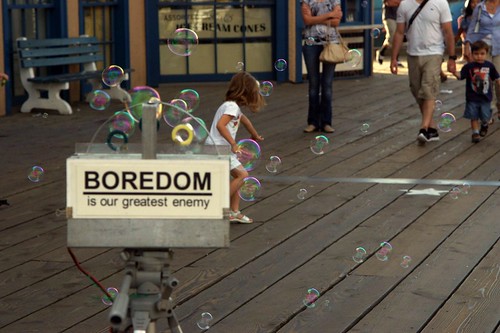I'm admittedly torn about the assessment thing... I'm left wondering whether opposition to perpetual reform of how teachers assess students is based more on a lack of understanding and poorly communicated strategy than fear or top-down direction to the contrary. Teachers need to find balance between high-quality current assessment practise, and action-oriented efforts to make future practise even better.
At the core of professional, responsible assessment is really strong and meaningful (real-time) communication (feedback) with students. Effective and solidly researched assessment practise (portfolio-based, two-way dialog between teacher and learner... group dialog has a place here as well- and perhaps even peer evaluation) is nothing new. Like many logical and pedagogically sound improvements to what teachers do, when we think we've discovered something new, some immediately and inevitably begin to resist out of ignorance. Seems to me the assessment issue is a
black swan- we think we've discovered 'new' and better ways to assess students, and now we're busy aggressively trying to justify them and convince our colleagues that they need to follow our lead and implement the same assessment strategies because they are more effective than those that the "uninformed" utilize.
For decades, teachers have been doing assessment in relatively the same manner- summative, high stakes, 'bell-curved' tests have been the norm for a long time... and that's OK because these
were what defined the limits of our understanding about how best to provide useful and positive feedback to students. Few would have predicted we would find better ways to evaluate students, (if the case were otherwise, it would have happened sooner...) but the reality is that today, we know more about how assessment works. Teachers don't have to justify pedagogically sound and responsible assessment, they just need to do it. Simply practising research-based, effective and meaningful assessment of students that surpasses previously-held understanding of what "works" is the best way to communicate best-practise with our colleagues...
morphic resonance will take care of the rest.
Teachers are professionally obliged to perpetually seek improved ways to do everything we do... including assessing students. Even more importantly, we are professionally responsible to share what we discover with others meaningfully, pragmatically and incrementally. The tipping point of assessment reform depends on how well we can display the effectiveness of new ways to evaluate students over time; and it will take time. It will also depend on our avoiding getting stuck in any "new" way of doing assessment. Like our limited perspective and conditioned acceptance regarding traditional forms of student assessment that have permeated our craft for decades, if we were to begin doing assessment differently, and then become resistant to critical analysis leading to even better ways, we'd right back where we started, wouldn't we?
I'm growing weary once again of the dichotomous perspective teachers appear to default toward on so many issues. There's the "old" way of doing something, and then there's the new (right) way according to the person making the claim. Instead of the
old vs. new way of doing assessment, I think teachers should simply always be looking for the
better way. To deny that this is a good, professional perspective would be ridiculous.
Change doesn't have to delineate right vs. wrong ways of doing things. When viewed as constant improvement, change never ends, and things never stop improving because getting it
right simply becomes making it better... everyday. There are no meaningful static goals in the education assessment realm. To be truly striving for excellence, the bar must be continuously inched upward.







